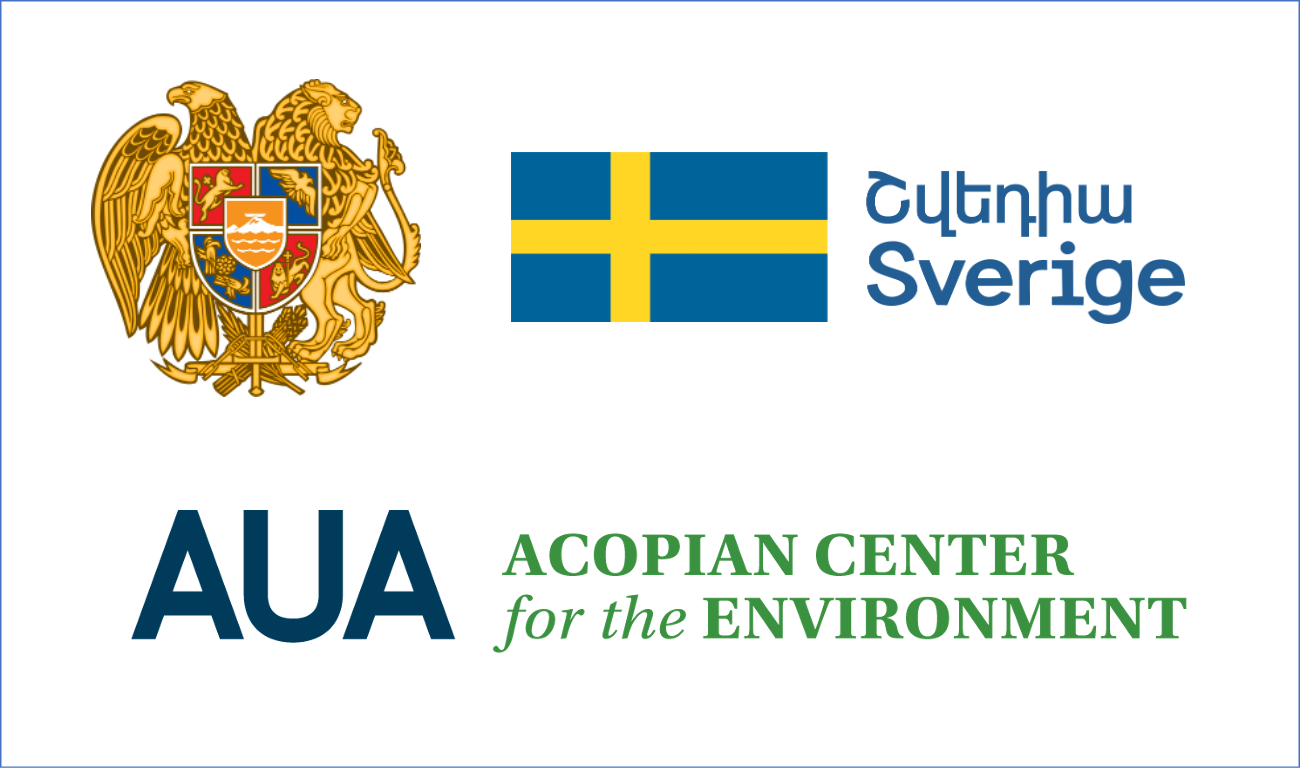Extended Producer Responsibility in Armenia

This FAQ is developed in the frames of 4-year Waste Policy Armenia program funded by Sweden and implemented by the American University of Armenia (AUA) Acopian Center for the Environment. It offers essential information about the Extended Producer Responsibility (EPR) system.
Waste Policy Armenia aims at improving country’s waste management sector capacity to implement more environmentally sound waste management practices through its three components:
- Providing support and technical assistance to RA Ministry of Environment in developing and adopting Extended Producer Responsibility (EPR) legislation for several specific waste streams in line with EU Waste legislation and best practices (Program Component 1);
- Providing support and technical assistance to RA Ministry of Territorial Administration and Infrastructure in developing a national model on waste source separation and introducing it as a system in Town of Sevan and other municipalities (Program Component 2);
- Building sector capacities to implement Component 1 and Component 2, as well as to scale up the achieved results (Program Component 3).
EPR Policy Brief (Armenian, 59 pages) EPR 2-pager (Armenian)
Extended Producer Responsibility (EPR) is an environmental policy that holds producers or importers of specific products responsible for the environmentally sound management of special wastes generated from the consumption of those products. This system encompasses the separate collection, recycling, or proper disposal of special wastes, along with the implementation of other measures.
Special waste refers to the waste generated through the sale, consumption, or use of EPR regulated products. It is a common practice to categorize wastes based on their specific characteristics. The list of special waste streams will be approved by the Government of the Republic of Armenia.
The specific groups of special wastes managed by EPR schemes usually include:
– container and packaging (mandatory in EU),
– batteries and accumulators (mandatory in EU),
– WEEE (waste electrical and electronic equipment, mandatory in EU),
– ELV (End-of-Life Vehicles, mandatory in EU),
– tires,
– oils, air and oil filters,
– textile,
– photovoltaic panels.
Within the framework of the EPR system, the producer is the party who first places a product subject to EPR requirements on the local market, whether it is manufactured within the borders of the Republic of Armenia or imported into its territory.
Who is not a producer in EPR schemes?
The manufacturers of containers and packaging are not classified as producers under Extended Producer Responsibility (EPR) regulations. Instead, importers or producers of products that contain containers and packaging are considered producers in EPR schemes.
For instance, a company engaged in the production of glass containers is not designated as a producer within the Extended Producer Responsibility (EPR) system. In this case, the producer within the Extended Producer Responsibility (EPR) system is the company engaged in the production of bottled water using glass containers and putting the final product on the market.
How do EPR schemes work?
Companies that are considered producers in the EPR schemes should establish Producer Responsibility Organizations (PROs), which are obliged to organize and coordinate the environmentally sound treatment of special waste streams generated from the consumption of EPR products.
In global practice, PROs are typically established as non-commercial, non-for-profit legal entities, formed by a minimum of two EPR producers. A PRO may assume responsibility for one or more types of waste.
The EPR fee for a specific type of waste is determined based on the costs associated with the collection and processing of that waste, which includes public awareness initiatives and some administrative expenses.
As an illustration, the EPR fee for one ton of tires is calculated, considering the costs associated with its collection and transportation from service points (e.g., 70,000 AMD/ton based on type and distance to the collection point) and processing costs (e.g., 230,000 AMD/ton). Consequently, a producer who sold 100 tons of tires in the current year would be required to pay 30,000,000 AMD as anEPR fee. This equates to an average of 3,000-4,000 drams per tire.
Per the EU-Armenia Comprehensive and Extended Partnership Agreement (CEPA), Armenia is mandated to introduce an Extended Producer Responsibility by the year 2024.
Since the late 1980s, the concept of Extended Producer Responsibility has evolved into an integral component of environmental policy, serving as an effective tool in numerous countries.
A well-operating EPR scheme will yield a range of benefits across environmental, economic, health, and social dimensions. These include:
- promoting the recycling industry in the country and increase the recycling rates
- reducing the volumes of landfilled waste and its harmful effects
- creating means for environmentally sound treatment of waste generated from EPR products
- easing the burden of waste management for local self-governance bodies
- creating jobs in waste management sector
- increasing the environmental rank of the country
- implementing sustainable consumption and production models (SDG 12)
- combating climate change and its impacts (SDG 13)
Every year, around 700,000 tons of municipal solid waste is generated in the settlements of Armenia. Most of the existing waste is disposed of in about 300 dumpsites currently in use.
Thanks to partially implemented waste sorting systems in various settlements, only a maximum of 5% of the total volume of recyclable waste (glass, paper, plastic, metal) is collected in the country. The majority of the recyclables (approximately 95%) is recovered from dumpsites by informal groups.
Aside from its adverse environmental, social, and public health effects, this practice also leads to the squandering of the economic potential inherent in waste as a valuable secondary material resource.
The introduction of EPR will also support the “polluter pays” principle by generating the required resources for the source-separated collection of special waste and its environmentally sound treatment.
